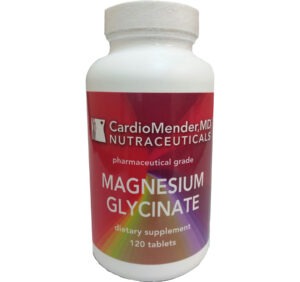Question: What is likely the most frequent and overlooked electrolyte deficiency affecting approximately 80% of Americans?
Clue: The answer is NOT Potassium or Calcium.
Magnesium deficiency is probably the most frequent and most overlooked electrolyte abnormality; an estimated 80 percent of Americans are deficient. Do you have symptoms of low magnesium?
- Muscle cramps
- Fatigue and weakness
- Headaches
- Palpitations
- Numbness
- Seizures
- Personality changes (i.e. irritability, depression and anxiety)
- GI symptoms
Magnesium deficiency is associated with the following medical conditions:
- Cardiovascular Disease: Coronary Artery Disease, Stroke, Hypertension
- Type-2 Diabetes
- Osteoporosis
- Migraines[4]
- Cardiac Arrhythmias and Sudden Cardiac Death[9]
Low Magnesium is associated with over 20 medical conditions including cardiovascular disease[8], cardiac arrhythmias [7], Type-2 Diabetes, osteoporosis, migraines, and anxiety disorders. Vascular disease is thought to be associated with excess calcium supplementation.
Magnesium helps maintain healthy physiology and optimal health and is required for maintaining optimal metabolism, blood pressure, blood sugar control, protein synthesis, and optimal physiology. [1-3]. Magnesium is important in maintaining optimal detoxification, neutralizing harmful substances in our body. Adequate levels of magnesium are very important for the normal functioning of our nerves, muscles (including our heart), bones and immune system. To maintain healthy bones our bodies need the proper proportions of calcium and magnesium as well as Vitamin-D and other essential vitamins and minerals.
Causation: Inadequate consumption and absorption of magnesium may lead to its deficiency. Absorption can be inhibited by drinking fluorinated water, caffeine, excess carbonated beverages, alcoholism, and many prescription drugs, including diuretics [5] frequently used in the treatment of hypertension and antibiotics such as ciprofloxin (Cipro®) and tetracyclines. Certain drugs used to treat heartburn (GERD), such as proton pump inhibitors (PPI’s) (lansoprazole (Prevacid®) and esomeprazole (Nexium®)) taken for prolonged periods, can cause low magnesium [6] as well as certain medications used to treat osteoporosis ie. alendronate (Fosamax®). Impaired absorption has been associated with the consumption of nonorganic foods due to the pesticides and fertilizers used in their cultivation. Also, stress disease has been associated with impaired magnesium absorption. Kidney disease can cause excess magnesium loss, but it can also conversely cause increased magnesium retention which may lead to elevated levels.
The challenge: Identifying magnesium deficiency since the associated symptoms are nonspecific (i.e. fatigue, muscle spasm, and anxiety) and most of our magnesium is stored within our bones and cells with only about 1% stored in our blood. Therefore blood levels do not reflect our body’s supply, [1,6] and more esoteric tests must be considered.
More to come next week…including why you should ask our Weight Loss & Wellness Physicians if Magnesium Supplementation is appropriate and what preparation is best for you!

Learn more about CardioMender, MD’s Magnesium Glycinate here.
References:
[1] Institute of Medicine (IOM). Food and Nutrition Board. Dietary Reference Intakes: Calcium, Phosphorus, Magnesium, Vitamin D and Fluoride. Washington, DC: National Academy Press, 1997.
[2] Rude RK. Magnesium. In: Coates PM, Betz JM, Blackman MR, Cragg GM, Levine M, Moss J, White JD, eds. Encyclopedia of Dietary Supplements. 2nd ed. New York, NY: Informa Healthcare; 2010:527-37.
[3] Rude RK. Magnesium. In: Ross AC, Caballero B, Cousins RJ, Tucker KL, Ziegler TR, eds. Modern Nutrition in Health and Disease. 11th ed. Baltimore, Mass: Lippincott Williams & Wilkins; 2012:159-75.
[4] Sun-Edelstein C, Mauskop A. Role of magnesium in the pathogenesis and treatment of migraine. Expert Rev Neurother 2009;9:369–79 [PubMed abstract]
[5] Sarafidis PA, Georgianos PI, Lasaridis AN. Diuretics in clinical practice. Part II: electrolyte and acid-base disorders complicating diuretic therapy. Expert Opin Drug Saf 2010;9:259-73. [PubMed abstract]
[6] U.S. Food and Drug Administration. Proton Pump Inhibitor Drugs (Ppis): Drug Safety Communication—Low Magnesium Levels Can Be Associated With Long-Term Use. March 2, 2011.
[7] A 2011 study published in the America Journal of Clinical Nutrition in 2011, found a 40 percent greater risk of sudden cardiac death among women with low levels of magnesium, compared to those with the highest concentrations. The study involved 88,000 nurses whose health histories were tracked for 26 years.
[8] https://ods.od.nih.gov/factsheets/Magnesium-HealthProfessional/#h3
[9] Magnesium deficiency and sudden death MJ Eisenberg – American heart journal, 1992 – Elsevier






